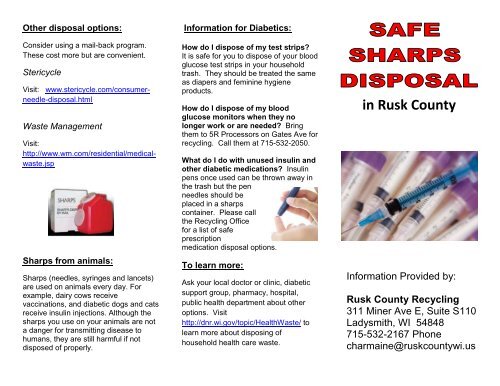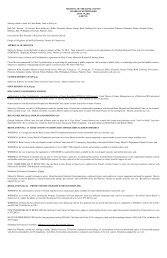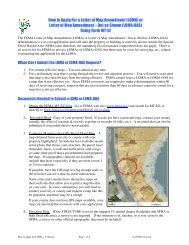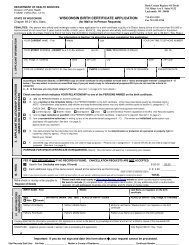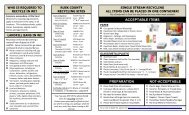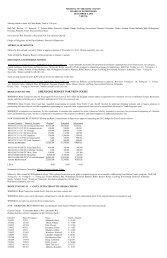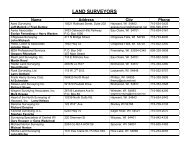Safe Sharps Disposal Pamphlet - Rusk County
Safe Sharps Disposal Pamphlet - Rusk County
Safe Sharps Disposal Pamphlet - Rusk County
You also want an ePaper? Increase the reach of your titles
YUMPU automatically turns print PDFs into web optimized ePapers that Google loves.
Other disposal options:<br />
Consider using a mail-back program.<br />
These cost more but are convenient.<br />
Stericycle<br />
Visit: www.stericycle.com/consumerneedle-disposal.html<br />
Waste Management<br />
Visit:<br />
http://www.wm.com/residential/medicalwaste.jsp<br />
<strong>Sharps</strong> from animals:<br />
<strong>Sharps</strong> (needles, syringes and lancets)<br />
are used on animals every day. For<br />
example, dairy cows receive<br />
vaccinations, and diabetic dogs and cats<br />
receive insulin injections. Although the<br />
sharps you use on your animals are not<br />
a danger for transmitting disease to<br />
humans, they are still harmful if not<br />
disposed of properly.<br />
Information for Diabetics:<br />
How do I dispose of my test strips?<br />
It is safe for you to dispose of your blood<br />
glucose test strips in your household<br />
trash. They should be treated the same<br />
as diapers and feminine hygiene<br />
products.<br />
How do I dispose of my blood<br />
glucose monitors when they no<br />
longer work or are needed? Bring<br />
them to 5R Processors on Gates Ave for<br />
recycling. Call them at 715-532-2050.<br />
What do I do with unused insulin and<br />
other diabetic medications? Insulin<br />
pens once used can be thrown away in<br />
the trash but the pen<br />
needles should be<br />
placed in a sharps<br />
container. Please call<br />
the Recycling Office<br />
for a list of safe<br />
prescription<br />
medication disposal options.<br />
To learn more:<br />
Ask your local doctor or clinic, diabetic<br />
support group, pharmacy, hospital,<br />
public health department about other<br />
options. Visit<br />
http://dnr.wi.gov/topic/HealthWaste/ to<br />
learn more about disposing of<br />
household health care waste.<br />
in <strong>Rusk</strong> <strong>County</strong><br />
Information Provided by:<br />
<strong>Rusk</strong> <strong>County</strong> Recycling<br />
311 Miner Ave E, Suite S110<br />
Ladysmith, WI 54848<br />
715-532-2167 Phone<br />
charmaine@ruskcountywi.us
To reduce public health risks, the<br />
state adopted rules in 1994<br />
requiring everyone in Wisconsin,<br />
even individuals at home, to<br />
manage sharps safely.<br />
It is illegal to put sharps in the<br />
trash or with recyclables.<br />
Where can I dispose of sharps safely?<br />
Business Name Program Cost<br />
RC Hospital Lab<br />
Marshfield Clinic<br />
Pharmacy<br />
Sells containers which includes disposal – approximately 2 qts<br />
Will take sharps in rigid containers but prefers they are in an<br />
approved sharps container and will charge a disposal fee<br />
Sells containers which includes disposal – 1 ½ qts. $5<br />
$3<br />
RC Clinic Pharmacy<br />
Pamida Pharmacy<br />
Walmart Pharmacy<br />
Sells containers only<br />
Sells containers only<br />
Sells containers only<br />
Four steps to safe packaging of sharps<br />
What are sharps?<br />
“<strong>Sharps</strong>” is the name used to describe<br />
needles, syringes, and finger-prick<br />
lancets used outside the setting of<br />
hospitals and doctor’s offices.<br />
Are sharps recyclable?<br />
NO! <strong>Sharps</strong> are not recyclable and<br />
should NOT be placed in a recycling bin.<br />
<strong>Sharps</strong> are the number one contaminant<br />
of recycling and pose a health risk to<br />
garbage haulers and workers in<br />
recycling facilities who might be<br />
accidentally stuck by them.<br />
1. Clip the needle points with needle clippers, or recap or re-sheathe discarded<br />
sharps to help prevent “needle sticks.” The needle-less syringe can go in household<br />
trash as long as it is empty.<br />
2. Place the sharps in rigid puncture-resistant containers with secure lids or caps.<br />
Acceptable containers include commercially-available sharps containers or heavy plastic<br />
detergent or bleach bottles with screw caps. Unacceptable containers include coffee<br />
cans (their lids are too easily punctured), plastic milk jugs, plastic bags, pop cans or soda<br />
bottles.<br />
3. Visibly label the sharps container with the words “bio-hazard,” “infectious waste” or<br />
“sharps,” or with the bio-hazard emblem. It’s also a good idea to label detergent bottles<br />
with the words, “Do not recycle” so that they are not accidentally included with<br />
recyclables.<br />
4. When the container is full, sealed and labels, store it out of reach of children<br />
and dispose of it properly. Do not put the container out with the trash or with<br />
recyclables.


